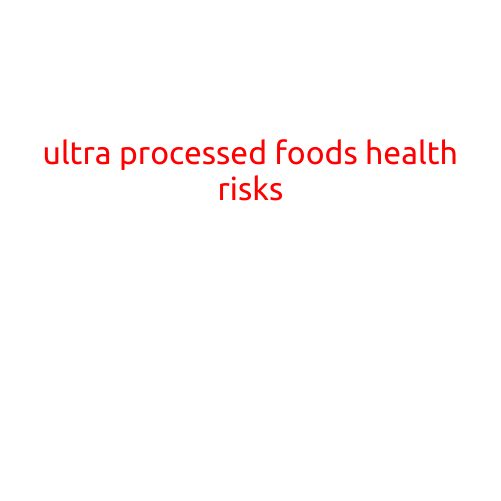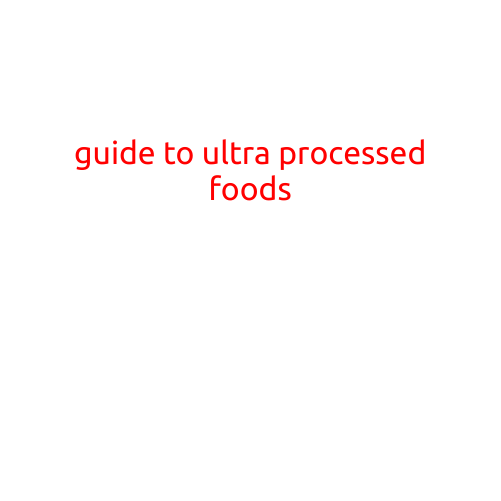
Ultra-Processed Foods: The Hidden Health Risks You Need to Know
In today’s fast-paced world, it’s easier than ever to grab a quick meal on the go. But with the rise of convenience foods, many of us are unwittingly consuming a diet rich in ultra-processed foods. These foods, manufactured using a range of techniques such as extrusion, hydrogenation, and dehydrification, have been linked to a range of health problems. In this article, we’ll explore the hidden health risks associated with ultra-processed foods and how to make a healthier switch.
What are Ultra-Processed Foods?
Ultra-processed foods are products that have been transformed from whole foods or minimally processed foods through various industrial processes. Examples include packaged snacks, frozen meals, sugary drinks, and many processed meats. These foods are often characterized by a long list of ingredients, many of which are unfamiliar or difficult to pronounce.
The Health Risks
Studies have consistently shown that a diet rich in ultra-processed foods is linked to an increased risk of chronic diseases. Some of the most significant health risks associated with ultra-processed foods include:
- Weight Gain and Obesity: Ultra-processed foods are often high in calories, sugar, and unhealthy fats, which can contribute to weight gain and obesity.
- Type 2 Diabetes: Consuming a diet high in ultra-processed foods has been linked to an increased risk of developing type 2 diabetes.
- Heart Disease: The high levels of sodium, added sugars, and unhealthy fats in ultra-processed foods can increase the risk of heart disease and stroke.
- Cancer: Some studies have suggested that a diet rich in ultra-processed foods may increase the risk of certain types of cancer, including breast, colon, and prostate cancer.
- Cognitive Decline: A diet high in ultra-processed foods has been linked to an increased risk of cognitive decline and dementia.
How Ultra-Processed Foods Affect Our Health
So, how do ultra-processed foods contribute to these health risks? Here are some key factors to consider:
- Lack of Nutrients: Ultra-processed foods are often stripped of essential nutrients, including fiber, vitamins, and minerals. A diet lacking in these nutrients can lead to a range of health problems.
- High Glycemic Index: Many ultra-processed foods have a high glycemic index, meaning they cause a rapid spike in blood sugar levels. This can lead to insulin resistance and an increased risk of chronic diseases.
- Inflammation: Ultra-processed foods contain artificial additives, such as preservatives and coloring agents, which can cause inflammation in the body. Chronic inflammation has been linked to a range of health problems, including arthritis, diabetes, and heart disease.
- Distorted Gut Microbiome: A diet rich in ultra-processed foods can disrupt the balance of gut bacteria, leading to changes in the way our body processes nutrients and increasing our risk of chronic diseases.
Making the Switch
The good news is that it’s relatively easy to make a switch to a healthier diet. Here are some simple tips to get you started:
- Focus on Whole Foods: Aim to include a variety of whole, unprocessed foods in your diet, such as fruits, vegetables, whole grains, lean proteins, and healthy fats.
- Choose Minimally Processed Foods: When shopping, opt for products with fewer and more recognizable ingredients.
- Cook from Scratch: Cooking meals from scratch using whole ingredients is a great way to avoid ultra-processed foods and ensure that you’re getting the nutrients your body needs.
- Read Labels: Become a savvy label reader. Check the ingredient list and nutrition facts to ensure that the foods you’re choosing are low in added sugars, unhealthy fats, and artificial additives.
- Shop the Perimeter of the Store: The healthiest foods are often found on the perimeter of the store, such as produce, meats, and dairy products. Avoid the center aisles, where ultra-processed foods tend to reside.
Conclusion
Ultra-processed foods are convenient, but the health risks associated with them are very real. By making a few simple changes to your diet and shopping habits, you can reduce your exposure to these hidden health risks and enjoy a healthier, more balanced lifestyle. Remember, the best diet is one that is rich in whole, unprocessed foods and low in artificial additives and preservatives.





